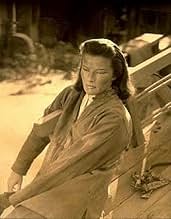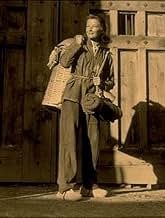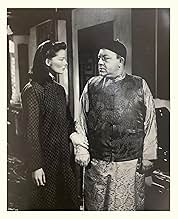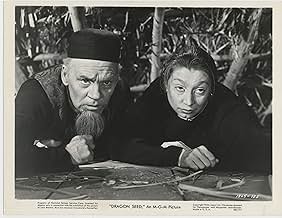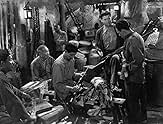ÉVALUATION IMDb
5,9/10
1,4 k
MA NOTE
Ajouter une intrigue dans votre langueThe lives of a small Chinese village are turned upside down when the Japanese invade it, and a heroic young woman leads her fellow villagers in an uprising against these invaders.The lives of a small Chinese village are turned upside down when the Japanese invade it, and a heroic young woman leads her fellow villagers in an uprising against these invaders.The lives of a small Chinese village are turned upside down when the Japanese invade it, and a heroic young woman leads her fellow villagers in an uprising against these invaders.
- Nommé pour 2 oscars
- 2 nominations au total
Philip Ahn
- Leader of City People
- (uncredited)
Albert Baldo
- Japanese Soldier
- (uncredited)
Histoire
Le saviez-vous
- AnecdotesFilmed in 1943 on the MGM lot in Culver City, CA, the film features an unusual assortment of non-Asian actors with odd accents playing Chinese and Japanese: Russian-born and Stanislavski-trained Akim Tamiroff as Wu Lien; Turhan Bey, Viennese born son of a Turkish father and Czechoslovakian mother as the middle son, Lao Er Tan; New England patrician Katharine Hepburn as his wife; American Aline MacMahon--no longer one of the wisecracking Chercheuses d'or de 1933 (1933)--as the wife of Ling Tang; English-born Henry Travers (best remembered as Clarence the Angel from La vie est belle (1946)) as the Third Cousin"; Irish-American J. Carrol Naish as the Japanese Kitchen Overseer; and finally Jewish Robert Lewis, co-founder of the Actors Studio and Meryl Streep's teacher at the Yale Drama School, as Japanese Capt. Sato.
- ConnexionsEdited from The Good Earth (1937)
Commentaire en vedette
Let us get the obvious criticisms out of the way first: DRAGON SEED could be held up as a classic example of mimicry and/or orientalism, with the supposedly Chinese characters played by a variety of actors from different backgrounds. Led by Walter Huston as the familial patriarch, the cast also includes the Russian-born and Stanislavski- trained Akim Tamiroff; Turhan Bey, the Viennese born son of a Turkish father and Czechoslovakian mother; New England patrician Katharine Hepburn; the English-born Henry Travers, and the Irish American J. Carrol Naish as a Japanese kitchen overseer.
On the other hand the film must be approached in context as a propagandist flag-waver designed to highlight the Japanese menace while emphasizing the importance of the global fight for freedom. In these terms Jack Conway and Harold S. Bucquet's epic works extremely well: the Japanese are portrayed as sadistic brutes who will stoop at nothing to achieve their aims - shooting dogs, raping and killing innocent women while relishing the thought of getting Hepburn's Jade Tan into bed. With the aid of Chinese traitor Wu Lien (Tamiroff), they set themselves up in a grand mansion and enjoy elaborate meals prepared by slave cooks, while capturing locals as slave labor.
Pitted against them are the local Chinese, part of a farming community dedicated to centuries-old rituals. Nothing, it seems, can disturb the peace of their lives. When the Japanese invasion occurs, they are pitifully under-prepared to cope: Ling Tan's (Huston's) eldest son Lao Er Tan (Bey) and wife Jade (Hepburn) leave to help build a city in the hills dedicated to making weapons; while another son Lao San Tan (Hurd Hatfield) goes off to join the Chinese army. Ling Tan and his wife (Aline MacMahon) are left behind to forage for themselves, often living on scraps.
While the film emphasizes the importance of rituals as the foundation of a stable society, it also looks forward to the future. Jade wants to teach her newly-born son to read, for it is only through reading that enlightenment can occur. Lao objects at first - he favors more traditional pastimes such as love-making - but as the action unfolds he understands his wife's concern. DRAGON SEED also preaches a doctrine of sexual equality: Jade spends most of the action working alongside her husband in manual labor dressed in overalls rather than the traditional attire of a rural peasant.
In the end even Ling Tan comes to realize the importance of fighting for his country's future, despite his love of peace. The film ends with a climactic sequence reminiscent of MGM's GONE WITH THE WIND, as the Chinese community decamps from its long-established village to make a new home in the hills.
Based on a best-selling novel by Pearl S. Buck, Marguerite Roberts's screenplay contains a few clunky lines, where the propagandist elements assume more significance than plot coherence; but the film offers the role of a lifetime to Turhan Bey, hitherto associated mostly with B-pictures and horror films for Universal. He takes the opportunity with both hands, proving as competent as Hepburn in delivering lines with élan, as well as convincing us of the character's sincerity of purpose.
DRAGON SEED is certainly long - perhaps too long at 144 minutes, but it certainly fulfills its purpose, especially for those forced to fight the Japanese at first-hand during the mid-Forties.
On the other hand the film must be approached in context as a propagandist flag-waver designed to highlight the Japanese menace while emphasizing the importance of the global fight for freedom. In these terms Jack Conway and Harold S. Bucquet's epic works extremely well: the Japanese are portrayed as sadistic brutes who will stoop at nothing to achieve their aims - shooting dogs, raping and killing innocent women while relishing the thought of getting Hepburn's Jade Tan into bed. With the aid of Chinese traitor Wu Lien (Tamiroff), they set themselves up in a grand mansion and enjoy elaborate meals prepared by slave cooks, while capturing locals as slave labor.
Pitted against them are the local Chinese, part of a farming community dedicated to centuries-old rituals. Nothing, it seems, can disturb the peace of their lives. When the Japanese invasion occurs, they are pitifully under-prepared to cope: Ling Tan's (Huston's) eldest son Lao Er Tan (Bey) and wife Jade (Hepburn) leave to help build a city in the hills dedicated to making weapons; while another son Lao San Tan (Hurd Hatfield) goes off to join the Chinese army. Ling Tan and his wife (Aline MacMahon) are left behind to forage for themselves, often living on scraps.
While the film emphasizes the importance of rituals as the foundation of a stable society, it also looks forward to the future. Jade wants to teach her newly-born son to read, for it is only through reading that enlightenment can occur. Lao objects at first - he favors more traditional pastimes such as love-making - but as the action unfolds he understands his wife's concern. DRAGON SEED also preaches a doctrine of sexual equality: Jade spends most of the action working alongside her husband in manual labor dressed in overalls rather than the traditional attire of a rural peasant.
In the end even Ling Tan comes to realize the importance of fighting for his country's future, despite his love of peace. The film ends with a climactic sequence reminiscent of MGM's GONE WITH THE WIND, as the Chinese community decamps from its long-established village to make a new home in the hills.
Based on a best-selling novel by Pearl S. Buck, Marguerite Roberts's screenplay contains a few clunky lines, where the propagandist elements assume more significance than plot coherence; but the film offers the role of a lifetime to Turhan Bey, hitherto associated mostly with B-pictures and horror films for Universal. He takes the opportunity with both hands, proving as competent as Hepburn in delivering lines with élan, as well as convincing us of the character's sincerity of purpose.
DRAGON SEED is certainly long - perhaps too long at 144 minutes, but it certainly fulfills its purpose, especially for those forced to fight the Japanese at first-hand during the mid-Forties.
- l_rawjalaurence
- 31 juill. 2016
- Lien permanent
Meilleurs choix
Connectez-vous pour évaluer et surveiller les recommandations personnalisées
- How long is Dragon Seed?Propulsé par Alexa
Détails
Box-office
- Budget
- 3 000 000 $ US (estimation)
- Durée2 heures 28 minutes
- Rapport de forme
- 1.37 : 1
Contribuer à cette page
Suggérer une modification ou ajouter du contenu manquant

Lacune principale
By what name was Les Fils du dragon (1944) officially released in India in English?
Répondre


